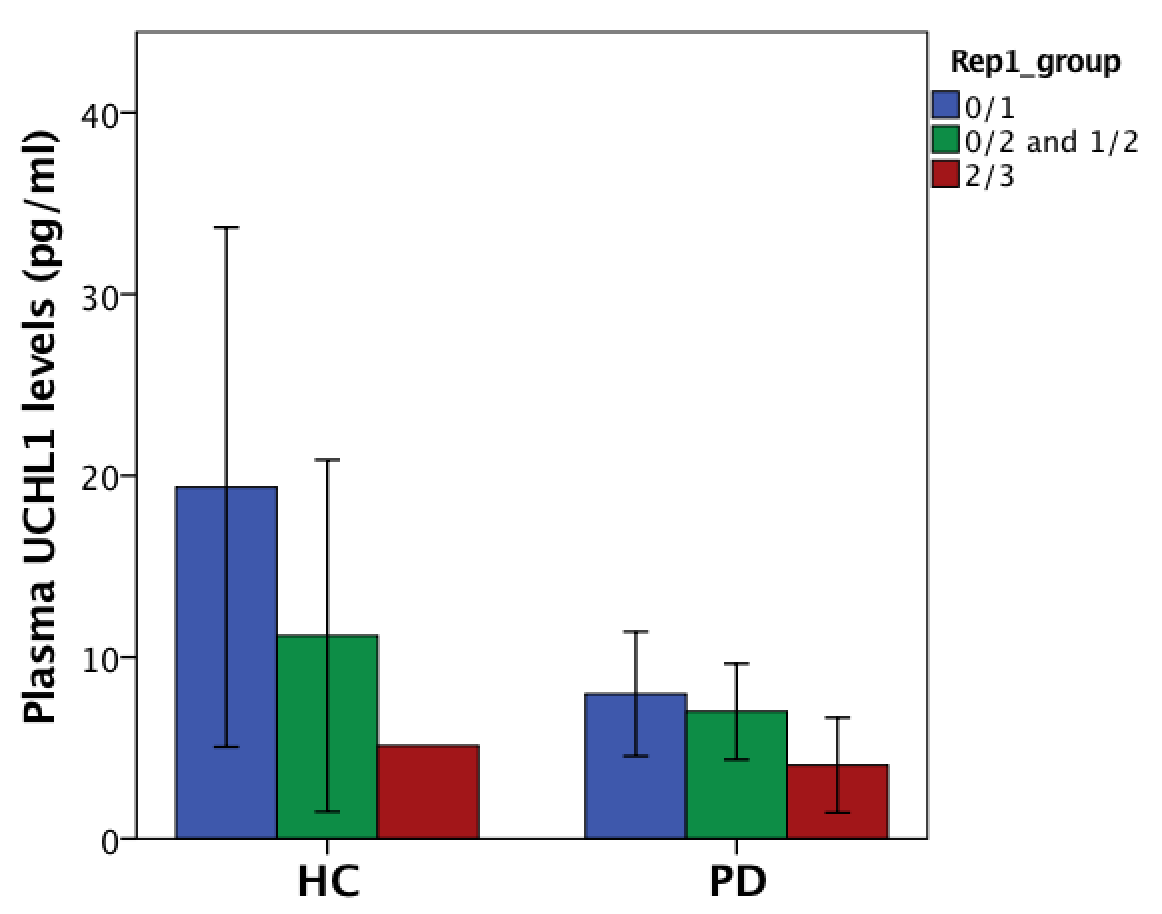Session Information
Date: Monday, October 8, 2018
Session Title: Parkinson's Disease: Genetics
Session Time: 1:15pm-2:45pm
Location: Hall 3FG
Objective: To determine plasma levels of UCH-L1 in patients with PD, and to investigate the association with both genetic (leucine-rich repeat kinase 2, LRRK2 and alpha-synuclein, SNCA) and clinical measures.
Background: Ubiquitin carboxy-terminal hydrolase L1 (UCH-L1), a pivotal component of the ubiquitin-proteasome system, is highly expressed in neurons and shown to be involved in regulation of the ubiquitin pool, apoptosis, learning and memory. Reduced expression of UCH-L1 has been reported in post-mortem brains with Lewy body dementia, while suppression of UCH-L1 activity in vivo resulted in accumulation of presynaptic alpha-synuclein in neurons. CSF levels of UCH-L1 are reported to be lower in PD than controls, but UCH-L1 levels in peripheral blood remain unknown.
Methods: Plasma levels of UCH-L1 and alpha-synuclein were measured using Single Molecule Array (Simoa) technology in 80 subjects (73 patients with PD and 7 healthy controls). All participants underwent tests of global cognition (mini-mental state examination, MMSE), motor function on the Unified Parkinson’s Disease Rating Scale (UPDRS), as well as disability scoring on the Hoehn & Yahr (H&Y) scale. All subjects were genotyped for reported Asian LRRK2 risk (S1647T, G2385P and R1628P) and protective variants (N551K and R1398H), and SNCA promoter region (Rep1) allele length (short-0/1, medium-1/2, long-2/3). The association of longer Rep1 allele length with increased risk of PD has been well-reported in multiple studies.
Results: Plasma UCH-L1 levels were significantly lower in PD patients than in controls (7.68 pg/ml vs 13.82, p=0.02). In the PD group, UCH-L1 levels did not correlate significantly with age, disease duration, MMSE, UPDRS motor and H&Y scores. However, PD patients with lower MMSE scores (MMSE≤25) showed lower UCH-L1 than controls (4.26 pg/ml vs 13.82, Bonferroni adjusted p=0.02). Notably in both PD patients and controls, subjects with longest Rep1 alleles (allele 2/3) had lower UCH-L1 levels than carriers of short- and medium-length alleles.
Conclusions: The results of this pilot study suggests that plasma UCH-L1 may be a potential biomarker for PD, with lower levels seen in PD vs controls, particularly in PD patients with lower cognitive scores, or with longest SNCA Rep1 alleles. More samples will be included in ongoing studies to validate these findings.
To cite this abstract in AMA style:
A. Ng, YJ. Tan, ZH. Lu, S. Ng, E. Ng, F. Setiawan, N. Keong, WL. Au, EK. Tan, L. Tan. A pilot study of plasma ubiquitin carboxyl-terminal hydrolase L1 (UCH-L1) as a potential blood-based biomarker in Parkinson’s disease [abstract]. Mov Disord. 2018; 33 (suppl 2). https://www.mdsabstracts.org/abstract/a-pilot-study-of-plasma-ubiquitin-carboxyl-terminal-hydrolase-l1-uch-l1-as-a-potential-blood-based-biomarker-in-parkinsons-disease/. Accessed December 30, 2025.« Back to 2018 International Congress
MDS Abstracts - https://www.mdsabstracts.org/abstract/a-pilot-study-of-plasma-ubiquitin-carboxyl-terminal-hydrolase-l1-uch-l1-as-a-potential-blood-based-biomarker-in-parkinsons-disease/

